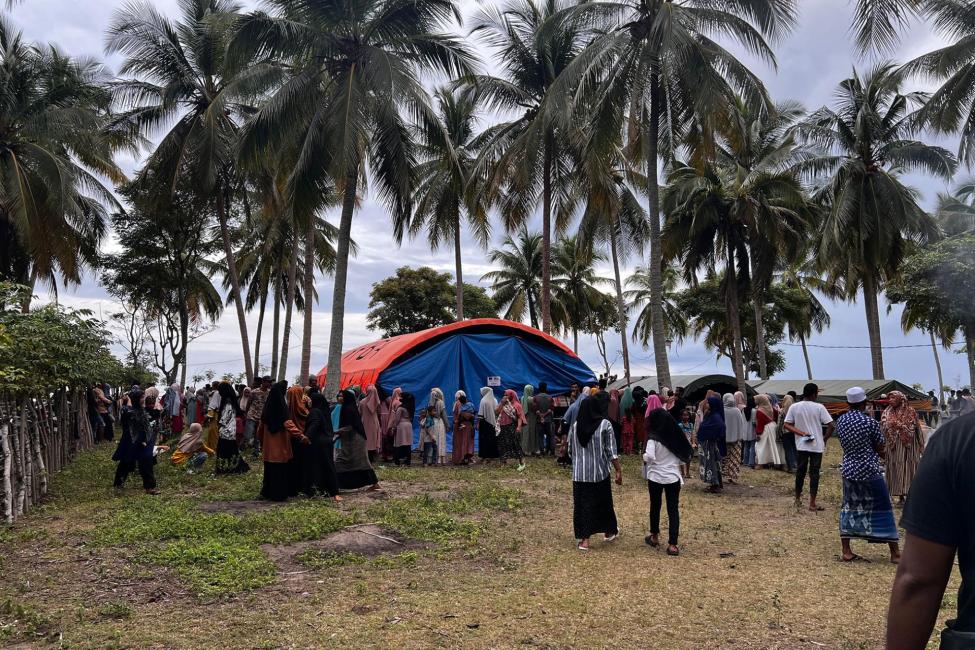-
Who we are
WHO WE AREThe International Organization for Migration (IOM) is part of the United Nations System as the leading inter-governmental organization promoting since 1951 humane and orderly migration for the benefit of all, with 175 member states and a presence in over 100 countries. IOM joined the United Nations system in September 2016.
About
About
IOM Global
IOM Global
-
Our Work
Our WorkAs the leading inter-governmental organization promoting humane and orderly migration, IOM plays a key role to support the achievement of the 2030 Agenda through different areas of intervention that connect both humanitarian assistance and sustainable development.
Cross-cutting (Global)
Cross-cutting (Global)
- Data and Resources
- Take Action
- 2030 Agenda
IOM Calls for Greater Support for Families of Migrants Missing en Route to Spain
Berlin – More than 9,100 people are known to have died on irregular migration routes to Spain since 1988, according to records collected by IOM’s Missing Migrants Project and the Andalusian Association for Human Rights (APDHA). The vast majority disappeared at sea, and their remains were never recovered. Others have been buried, unidentified, in unnamed graves.
Their families are left with no news, struggling to find answers that may never come.
Research published today by the International Organization of Migration (IOM)’s Global Migration Data Analysis Centre (GMDAC) and the Missing Migrants Project found that families of migrants missing on irregular migration routes to Spain face multiple obstacles in their efforts to trace their missing relatives. Most families are left to deal with the challenges themselves, as there are no specific programmes to support them.
“The disappearance of people on migration journeys has a devastating impact on their relatives and loved ones which can last a lifetime – particularly if the fate and whereabouts of those missing are never established,” said Frank Laczko, IOM GMDAC Director in Berlin.
The research, carried out in collaboration with Gabriella Sanchez (research coordinator of the IOM project) and Carlos Arce at the University of Córdoba, found that families of missing migrants in Spain were unable to report their relatives’ disappearances due to the lack of a centralized body or entity in the country to address missing-migrant cases.
Some families living in Spain were reluctant to report the disappearance of their loved ones given their immigration status and the precariousness associated with it. Others had contacted a range of authorities but obtained no answers. A few families reported having been victims of scams and fraud intended to extract money from them in exchange for information. Others in countries of origin stated that they were unable to travel to Spain for the purpose of a search given the complex visa requirements.
“You know, as time goes by, there [is] no news. We just want to know if he is alive or dead. We just want to know something,” said Mohammed, a Moroccan man living in Spain who is searching for his missing older brother. “He was my favourite brother. I always looked up to him. I am still searching for him.”
The ongoing humanitarian crisis of deaths and disappearances on migration routes to Spain and Europe broadly highlights the need to improve mechanisms to search and identify missing and deceased migrants, and provide answers to their families. While the priority has been to provide humanitarian and emergency assistance to those who arrive irregularly in Spain, the search for missing persons and the identification of the deceased are humanitarian duties too.
The report recognizes Spain’s longstanding efforts and commitment to saving lives at sea and suggests ways in which these efforts could be complemented by additional actions to help the families of those who go missing on their journeys to find answers. The findings of the research are intended to contribute to the implementation of Objective 8 of the Global Compact for Safe, Orderly and Regular Migration, which calls on States to save lives and establish coordinated international efforts on missing migrants, identify those who have died or gone missing, and to facilitate communication with affected families. IOM calls on States to honour their commitments under the Global Compact for Migration and take urgent action to establish mechanisms allowing families of missing migrants to receive answers about the fate of their loved ones.
Find the new report “Families of missing migrants: Their search for answers, the impacts of loss and recommendations for improved support” here.
“Living without them – Stories of families left behind” is a 4-part podcast series produced by IOM about the research project with families of missing migrants. Listen to the fourth episode about the stories of families of missing migrants in Spain here.
For more information, please contact:
In Berlin: Jorge Galindo, Email: jgalindo@iom.int, Tel: +49 160 179 1536
In Madrid: Oussama Elbaroudi, Email: ouelbaroudi@iom.int, Tel: +34 915 943 670
In Brussels: Ryan Schroeder, Email: rschroeder@iom.int, Tel: +32 (0) 492 25 02 34
In Geneva: Safa Msehli, Email: smsehli@iom.int, Tel: +41 79 403 5526

